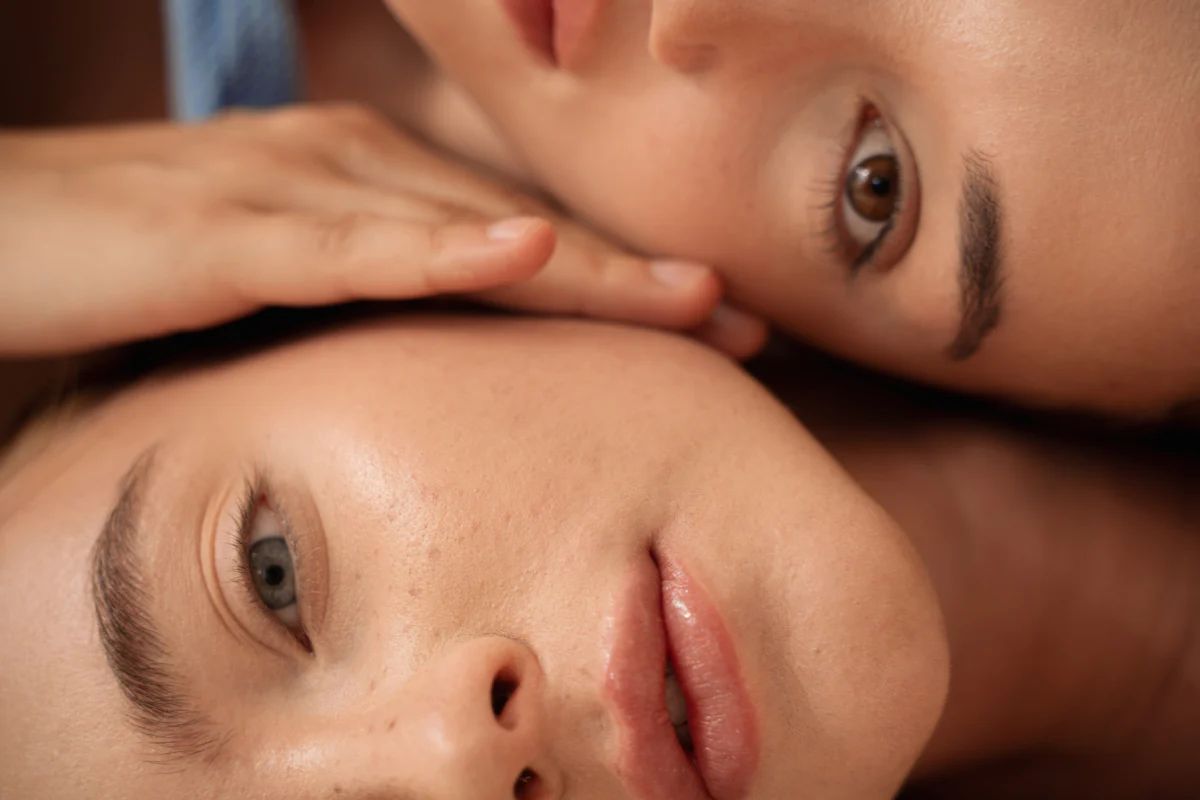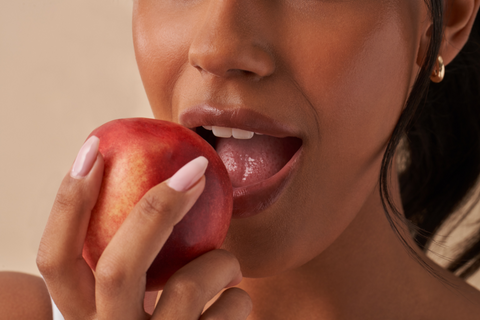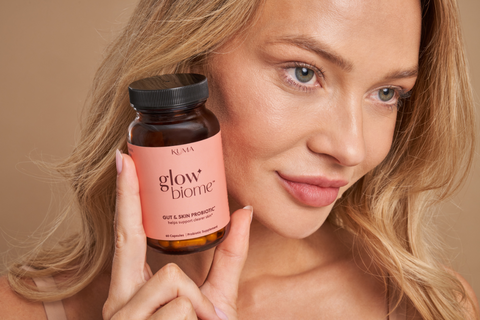acne root causes
5 Surprising Causes of Oily Skin…and What You Can Actually Do About it
Do we have to accept a life of excess shine, or can we take action towards balance and less oily skin? We break down the possible causes so you can assess a personal approach.

Do we have to accept a life of excess shine, or can we take action towards balance and less oily skin? We break down the possible causes so you can assess a personal approach.
Do we have to accept a life of excess shine, or can we take action towards balance and less oily skin? We break down the possible causes so you can assess a personal approach.
We tend to think it’s a little trite to group us all into just four categories… Oily, Dry, Combination, or Normal, as if we are a few of Snow White’s dwarves. First of all, Combination can iterate a bold medley of many symptoms and causes. And who gets to decide who’s Normal, anyway? Assuming this means all the others are ‘othered?’ Rude. While the owners of oily skin don’t deserve to be ‘othered,’ they do deserve answers.
How common is oily skin?
Oily skin is very common, actually. In fact, an estimated 66-75% of 15-20 year olds, 38% of 18-29 year olds, and 32% of 30-49 year olds may experience oily skin. Those who identify with having oily skin may suffer acne and breakouts, while others may sport a wet-look shine sans pimples, but still experience larger pores, uneven texture, and other forms of congestion.
But, of course, we needn’t pity this percentage. Sebum isn’t the devil herself— it's actually a crucial component of healthy skin, helping to protect and maintain healthy skin. It even defends our skin against infection and other environmental assaults.
The key is to strike the right balance - not too little, not too much, just enough to keep our skin healthy, hydrated, and glowing.
Because there are so many factors involved, we can't attribute oily skin to one singular cause. Below are four common possible causes of excess oil production, and what you can do about it. We all have different lifestyles, diets, habits, and genetics, so the key to achieving less oily skin is to experiment with natural remedies to find what works best for you.

1. Diet
What we eat plays a large role in how our skin behaves. Certain foods like dairy, refined carbs, and highly-processed foods may show up on our faces as breakouts or excessive oil production.
Dairy
Dairy such as milk, cheese, and ice cream contain high levels of hormones (including insulin-like growth factor or IGF-1) which can lead to increased oil production, blocked pores, and breakouts.
Multiple large-scale studies have shown a link between dairy consumption and excess oil production and acne.
Instead, try dairy-free alternatives, such as almond milk or vegan cheese. To get your calcium, be sure to add dark leafy greens (such as kale, broccoli, or turnip greens) to your diet, along with other plant-based sources of calcium, such as tofu, beans, lentils, seaweed, and almonds.Refined Sugar
While we shouldn’t avoid all forms of sugar (hello healthy fruit and root veggies!) steering clear of refined sugars and refined carbohydrates found in processed foods can make a huge difference in your skin. What exactly is a refined carbohydrate? So glad you asked— think: white bread, pasta, cereal, baked goods, pretzels, and anything made with flour or added sugar.
The stats on refined carbs affecting oil production and breakouts are kind of a big deal. One study found that people who regularly consumed added sugars had a 30% greater risk of developing acne, while those who often ate things like pastries and cakes had a 20% greater risk. For those of us with oily skin… this kind of knowledge is real skin power.
2. Hormonal Imbalance
Hormones Rule Everything Around Me. Er, us. A lot of us tend to think that hormones just pop up when we are menstruating, pregnant, etc. But, in reality, every single bodily function is governed by hormones, and their levels fluctuate and move every day, all day, in different ways.
Hormones control the sebaceous glands, so oily skin and acne can be a sign of imbalance...but don't shoot the messenger! Hormones are not the real problem - they are simply reacting to your food, stress, and environment. Instead, you want to direct your attention towards the habits that might be causing them to become unbalanced in the first place. For example:
Constipation and Hormonal Imbalance
Having less than 1 bowel movement/day (or not fully evacuating everyday - say with pebble-like poos) can contribute to hormonal imbalance, because the way we remove excess hormones is through the stool. If the broken down excess hormones sit in the gut too long, they can get reabsorbed back into the blood stream, contributing to imbalance. That's why it's so important to eat an adequate amount of fiber, drink plenty of water, and ensure your gut is teeming with good bacteria that support regularity.
Taking a high quality probiotic which contains the strains B. lactis and L. rhamnosus GG, may help get the pipes moving.

High Glycemic Load Diet & Hormonal Imbalance
The refined carbs strike again. Quelle horreur!
I know if sounds like we're coming for your cookies, but, the truth is, there is quite a bit of research linking the sweet stuff to not just skin problems, but hormonal imbalances, too.
A high glycemic load diet - one that includes too many refined carbohydrates - leads to high levels of blood sugar, insulin and IGF-1 (that pesky hormone that has been linked to excess oil production and breakouts). Multiple studies have suggested a link between insulin resistance and acne.
We also know that high insulin, from consuming too many refined carbohydrates, can cause the female body to overproduce androgens (like testosterone) which not only increases oil production and acne, but can also contribute to conditions like PCOS and hirsutism (the abnormal growth of facial or body hair in women).
The good news is, sweet foods are still on the menu of a healthy skin diet, it's simply about choosing complex carbs over refined carbs when you can. Think brown or black rice instead of white rice, whole fruit-sweetened desserts (hello banana bread and date rolls), or treats sweetened with natural zero-glycemic sweeteners like pure monk-fruit or pure stevia.
It's even OK to include some refined sugar or refined carbohydrates in your diet without worrying about your skin, as long as your mindful of portions and how often you consume them. When they make up a minority of your diet - think occasional treats a few times a week - as opposed to the majority of your diet - at most or all meals - you satisfy your skin and your cravings.
Healthy skin truly does begin in the gut.

3. Stress and Anxiety
Speaking of hormones, one we don’t typically consider in this conversation is cortisol. Cortisol is a hormone that is released during stress, which is totally normal and typically a good thing. However, when we are responding to emails with the cortisol levels of someone being hunted for sport on a daily basis, this is, how do you say, not normal. Common, yes. But normal? Nope.
The hormone cortisol can directly increase sebum production, which oily skin sufferers might argue makes them more stressed. Ah, the vicious cycle. To-boot, chronic, daily stress also creates a flood of other chemicals in the body, including androgens; the male hormones that can trigger oil production, and inflammatory chemicals, which also contribute to breakouts.
So before we get stressed about our oily skin, it’s important to first address the sources of stress that precede it. Making breathing exercises a part of your daily practice (and let’s face it, beauty routine) as well as prioritizing wind-down time after work and time spent with loved ones can decrease this surge noticeably. Om.
4. Harsh Skincare
So often our response to over-active skin conditions like oiliness is to immediately KILL IT WITH FIRE. AKA, go hard on the actives. Harsh, drying washes, over-exfoliation with acids, and overuse of actives like retinoids can actually do way more damage than good, essentially freaking out the skin barrier and urging it to respond with, you guessed it, more oils.
Sebum is not the enemy. In fact, it’s a major part of the skin’s microbiome (yes, our microbiome isn’t only limited to the gut) which is a protective layer of flora that works to combat bad bacteria, and is cushioned in a thin layer of protective oils. When we completely strip the skin of oil, it kicks into high gear to produce more in order to regulate the skin biome and protect itself. Over-stripping the skin will not kill the problem, but declare war on it. The battle will be shiny. And probably inflamed.
Instead, try using gentle washes, stick to once-per-week exfoliation, and don’t skimp on hydration and moisture. Moisture is not the enemy of oily skin. Moisture is our friend.
5. Genetics
If you’re wondering why you’re clearing a pack of blotting papers a week and your bestie hardly ever has to touch up her foundation, it may be deeper than hormones, stress, harsh products, or even diet. Our genetics may play a role in how our skin chooses to behave, so if larger, more active pores run in our blood, we can’t run away from that. Well not entirely.
You see, although we used to think genes are our body's dictator, and can't be changed, the reality is genes are not our fate. The study of epigenetics has shown us that our diet and lifestyle can indeed influence our genes. So, if you think oily skin runs in your family, you may have to be a little more mindful about your diet and lifestyle choices than others, but you can absolutely get a handle on it through diet and lifestyle changes.
And while you do, remember that oil, which is emollient, protects the skin, and will result in more youthful-looking skin than someone with genetically dry skin later down the line. So take that friend with genetically clear skin!
Taking care of our gut, a mindful eye on our diet, using skin-supporting products rather than aggressive stripping agents, and regularly engaging in anti-stress protocols are a given for all skin conditions, but learning to love our skin and supporting it as it is will be key to thriving barrier and complexion. Glow on.
Glow Biome is a probiotic supplement formulated to tackle skin health from the inside out, and has been shown in a clinical trial to reduce excess oil by 32% in just 6 weeks.
